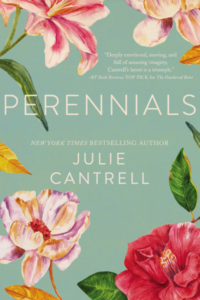Julie Cantrell’s latest novel, Perennials (Thomas Nelson), is a poignant, thought-provoking story told in a lyrical Southern style—and set in Julie’s hometown of Oxford, Mississippi. When two estranged sisters reunite for their parents’ 50th anniversary, a tragedy leads to unexpected hope and healing. Here, Julie reveals the inspiration behind this moving story, how it relates to nearly everyone, and what she loves about her Southern hometown.
What can readers expect from Perennials?
Perennials is near and dear to my heart because it is set right here in Oxford, but I’ve also been incredibly moved by the responses I’ve received from early readers. You wouldn’t believe the stories people share with me about their own sibling rivalry or estranged relationships. It seems everyone can relate in some way or another to Lovey and Bitsy’s complicated sistership or the issues these characters have faced with the men in their lives. Most people have been hurt by someone they love, and that’s what this book explores—what it really means to love one another.
What is it about family that causes so much turmoil in our lives?
I think our family wounds hurt us so deeply because these are the people we love most in the world, the people we want so desperately to love us in return. We long to be seen and understood, especially by our family members. And yet, it doesn’t always work that way. The challenge is to find a way to love one another in spite of it all.
 How did the idea for Perennials come to be?
How did the idea for Perennials come to be?
That’s kind of a bittersweet story, actually. I wrote this novel during a particularly dark time in my life. You know, life tends to do that to us at some point along the way, sweep the rug out from under us or whatever. One morning, when I was having one of those “Why me” moments, feeling hopelessly burdened by the situation I was facing, I started to feel like all was lost. It was truly a dark night of the soul moment, if I want to put it in terms of plot structure.
Anyway, I walked outside and saw a new bloom on my stargazer lily. It was just the sign I needed. It reminded me that life comes back. That lily had been given to me by one of my dearest friends nearly twenty years earlier. The flower had survived more than a dozen moves, as I transplanted her from home to home. The last move had been under particularly dire circumstances, and I had to plant her in a shallow pot with sub-par conditions, and yet there she was … in bloom. That’s the spark that led to Perennials.
You set Perennials in your hometown, Oxford, Mississippi, a community that’s been known for literature since the days of William Faulkner. How has Oxford shaped your journey as a writer?
There’s no place quite like Oxford. I’ve lived many places across the country, but I had never met an author until I moved here fifteen years ago. Suddenly, writers were everywhere.
Beth Ann Fennelly was one of the first I met. We discussed pancakes during a Mother’s Day ceremony at our children’s preschool. Then, Tommy Franklin asked me to tie his daughter’s bow during an elementary school Halloween carnival. I didn’t know them. They didn’t know me. We were just parents doing our best to support our kids. It wasn’t until later that I realized they were also married to one another and they were both esteemed authors. That’s when I realized you could be a parent, and a spouse, AND an author.
Fateful encounters like those changed the course of my life. Without Oxford, without Mississippi, I likely would never have dared write a book, much less publish it.
Your books all have an element of spirituality in them. Why do you incorporate faith in your stories?
I believe most stories examine spirituality on some level. Whether you call it Good vs. Evil or Light vs. Dark or you frame it into a particular religious context, the myths, novels, plays, parables … they all teach us about conquering fears, overcoming challenges, slaying the beasts. This is faith. The belief that we have a purpose. That we are here to do no harm. That we exist to love one another. That our choices matter. That’s faith.
Some readers have criticized my books for being too Christian. Others have criticized them for being not Christian enough. Either way, my stories seem to lead people to think deeply about what they believe and why. I consider that a good thing.


